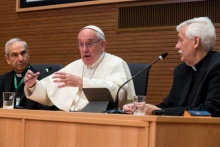Bringing all people the lasting joy of the Church should be the focus of their service, Pope Francis told representatives of the Jesuits on Monday, as he urged them to shun pursuit of worldly leadership and position.
“The service of good courage and discernment makes us men of the Church – not clerical men, but churchmen, men ‘for others,’ without our own thing that isolates but placing everything we have in communion and service,” he said Oct. 24 to the 36th General Congregation of the Society of Jesus at the order's general curia in Rome.
“We walk neither alone nor comfortably; we walk with ‘a heart that does not rest, which does not close in on itself, but which beats to the rhythm of a journey that takes place along with all the faithful people of God,’” he said, quoting a homily he gave in January 2014.
“Let us walk, making ourselves all for all.”
After praying Morning Prayer together, the Pope – who himself joined the Jesuits in 1960 – spoke to the delegates at the general congregation about the future of the order.
Reflecting on the existence of obstacles to “fervor in the mission” by the “enemy of human nature”, Francis offered three points for combatting this, having to do “with joy, with the Cross and with the Church, our Mother.”
Afterwards, Pope Francis met privately with the new Superior General of the Jesuits, Fr. Arturo Sosa.
Fr. Sosa, 67, was elected Oct. 14, marking the first time a Latin American has led the Society; moreover, he takes the helm under the Church’s first Jesuit and Latin American Pope.
“When, in the service of God, we go climbing better and better,” the Pope told the Jesuits, they must “ask insistently for consolation” in order to bring consolation to others, because the Gospel cannot be proclaimed in sadness.
“This ‘service of joy and spiritual consolation’ is rooted in prayer,” he said. It consists in encouraging everyone to “seek earnestly the consolation of God.”
“Practice and teach this prayer, for to ask and beg for consolation is the main service of joy,” Francis noted. “Joy is constitutive of the gospel message … good news cannot be given with a sad face.”
Secondly, he said they need to allow themselves to be “moved by the Lord on the cross.”
“The Jubilee of Mercy is a propitious time to reflect on the mercy of the services,” he said. “I say this in the plural because mercy is not an abstract word, but a way of life, which puts the word in concrete gestures which touch the flesh of others and are institutionalized in works of mercy.”
“The Lord, who looks at us with mercy and chooses us, sends us” to bring the same mercy “to the poor, the sinners, the rejected and the crucified of the world today who suffer injustice and violence.”
“Only if we experience this healing power to the heart of our own wounds, as individuals and as a community, will we lose the fear to leave.” Then we will be able to “walk patiently with our people,” he said, “learning from them the best way to help and serve.”
The Pope also emphasized the rule of “thinking with the Curch”, which he said is the grace to discern, not just to think “or arrange for the good.”
“You have to perform it with the good Spirit,” he said. “This is what roots us in the Church, in which the Spirit acts and distributes the diversity of its charisms for the common good.”
Focusing on being “ecclesial” rather than “clerical,” means that the Society “has and will always have the face, the accent, and the way of being of all peoples, of every culture, fitting in all, specifically the heart of every people, to make the Church there with every one of them, inculturating the Gospel and evangelizing every culture.”
Francis encouraged the members in their work, reminding them that the works of mercy were the “daily bread” of St. Ignatius and his first companions.
“The Jesuit priest is a servant of the joy of the Gospel,” he said, “both when he works ‘by hand’ in conversation and giving retreats to one person,” and when working “in a structured way by organizing works of training, of mercy, of reflection.”
culled from: Catholic News Agency


